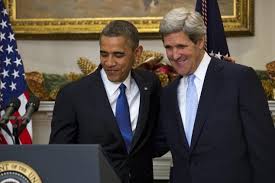 US President Barack Obama has refrained from public comment on Secretary of State John Kerry’s brokering of renewed Mideast peace talks, a reflection of how preliminary the president considers the development.
US President Barack Obama has refrained from public comment on Secretary of State John Kerry’s brokering of renewed Mideast peace talks, a reflection of how preliminary the president considers the development.
“We’re at a stage here that represents some positive progress but is not representative of a conclusion of anything,” White House press secretary Jay Carney said.
Carney, speaking to reporters before yesterday’s private meeting between Obama and Kerry at the White House, described Obama’s level of optimism about the peace process as “very cautious.” He said Kerry’s July 19 announcement is “an important development, but I don’t want to overstate it or understate it.”
Kerry, who spent four days prodding both sides during his sixth visit to the Mideast this year, announced that Israeli and Palestinian officials agreed on a plan to renew direct peace talks and were seeking to hold a meeting in Washington within days.
The renewed hope for an Israel-Palestinian peace coincides with tumult elsewhere in the region, including Egypt to the Israel’s south and Syria to the north.
The last negotiations between Israel and the Palestinians broke down three years ago after Israeli Prime Minister Benjamin Netanyahu declined to extend and expand a 10-month freeze on new construction of West Bank settlements.
First Step
State Department spokeswoman Jen Psaki yesterday called Kerry’s preliminary deal “a very important first step” and “the first time in years the official negotiators for both sides have publicly agreed to meet at this level.”
“There are elements that still need to be formalized,” she said. “But, to be clear, we have an agreement between parties to resume final status negotiations.”
Marwan Muasher, who oversees Middle East research at the Carnegie Endowment for International Peace, a Washington policy institute, said for now the White House “does not look prepared to cash in any political chits on the peace process when it feels that the chances of success are very slim.”
Down the road, Muasher said, a deal is unlikely unless Obama becomes more involved.
“The parties are not going to basically bridge the gap without a proactive White House policy — a willingness not just to stand by the proposals but to push or cajole the parties and offer the economic and security guarantees both parties might need,” he said.
Early Effort
Obama waded into the peace process shortly after taking office in 2009, pressing the Israelis to freeze settlement construction to restart negotiations. Israel rejected the administration’s call and Obama’s stance strained relations with Netanyahu.
By 2011, Obama had backed away from the approach and the U.S. vetoed a resolution before the U.N. Security Council calling Israeli settlements in the West Bank illegal.
In March, Obama traveled to Israel to reset relations with Netanyahu in an effort to coordinate policy on Iran and encourage, without over-promising, a return to talks with the Palestinians. He designated Kerry to run the follow-up talks with Israelis and Palestinians.
Aaron David Miller, a former Mideast peace negotiator and vice president of the Woodrow Wilson International Center for Scholars in Washington, said Obama was “burned” by his early efforts at intervention and is waiting for more signs that Netanyahu and Palestinian PresidentMahmoud Abbas are serious.
Setting Expectations
“The last thing you want to do right now is crowd these guys,” Miller said. That “the White House is not out there issuing statements and raising expectations is good, smart politics.”
Kerry “needs to figure out a way to invest both Abbas and Netanyahu,” Miller said. “Over time he must make it Obama’s as well and the only way he’s going to do that is narrowing the gap and showing normal human beings that this is real.”
Former U.S. President Jimmy Carter, who brokered the Camp David agreement of 1978, said the movement toward talks was encouraging because both sides in recent years have been reluctant to give ground.
Netanyahu and Abbas are under pressure “not to go to the negotiating table if it involves the most crucial single element, and that is borders,” Carter said yesterday at an event held by the Carnegie Endowment for International Peace in Washington. “So the question is will the United States insist on 1967 borders with modifications based on land swaps.”
Bloomberg

Leave a Reply
You must be logged in to post a comment.